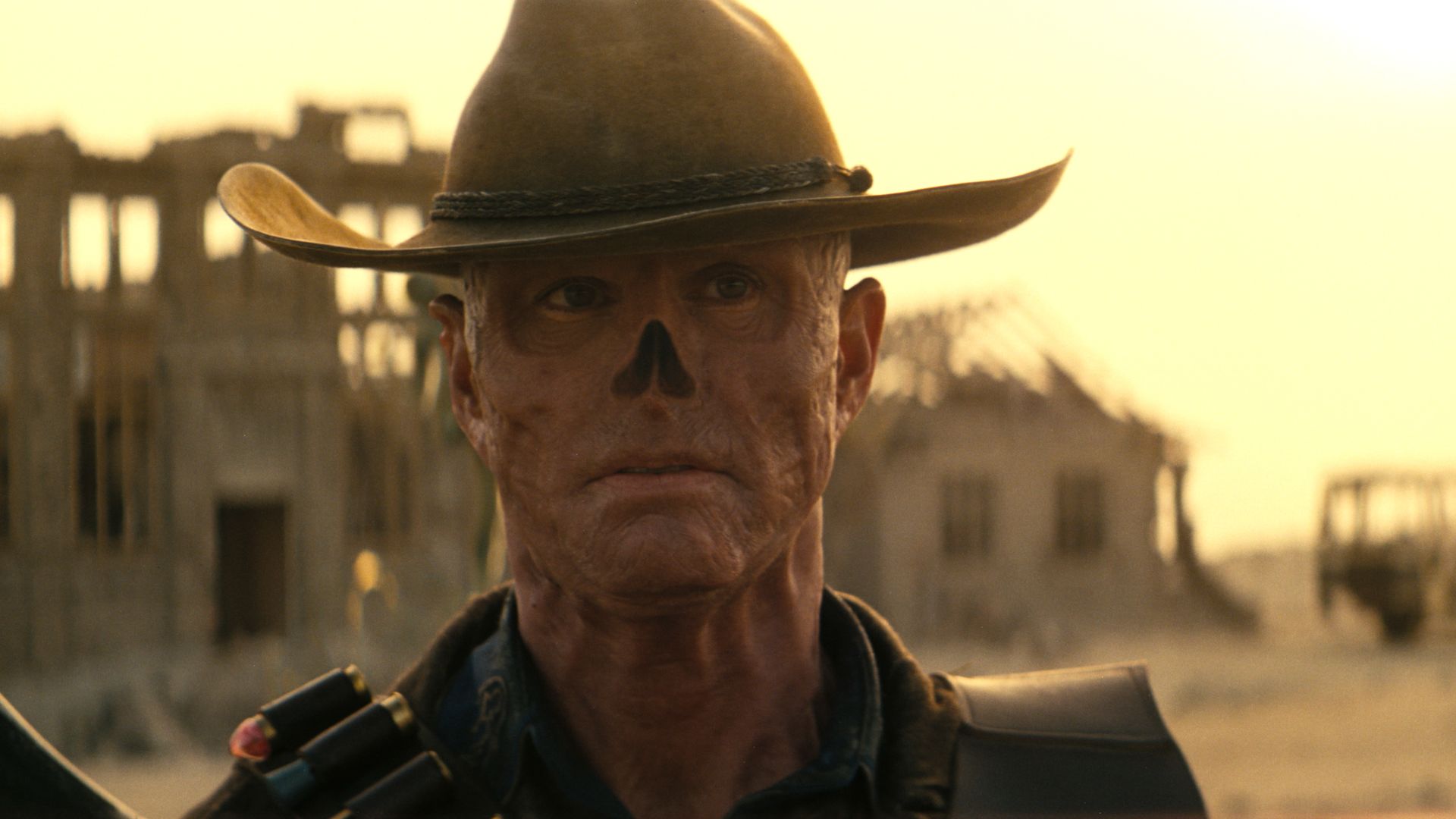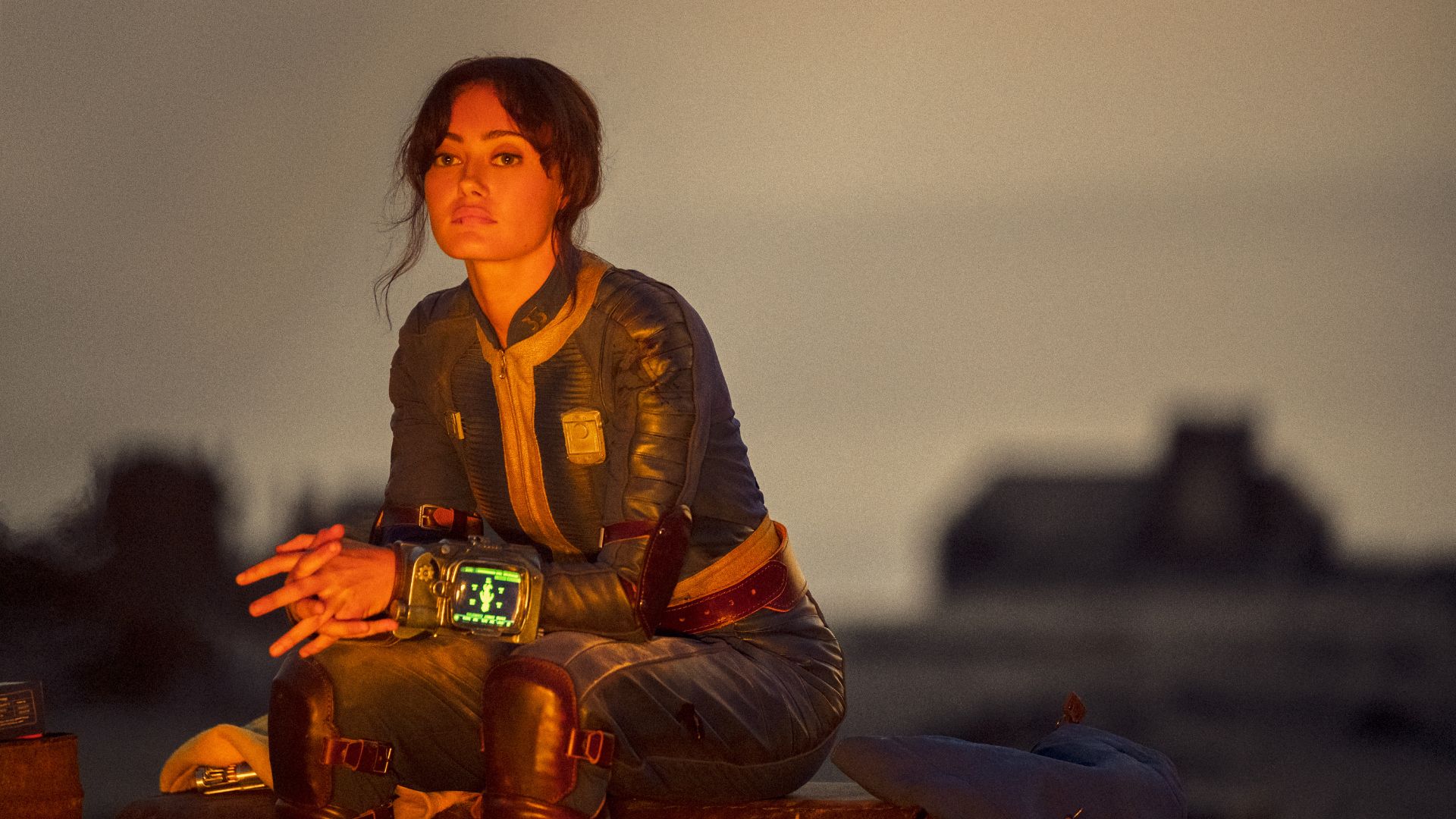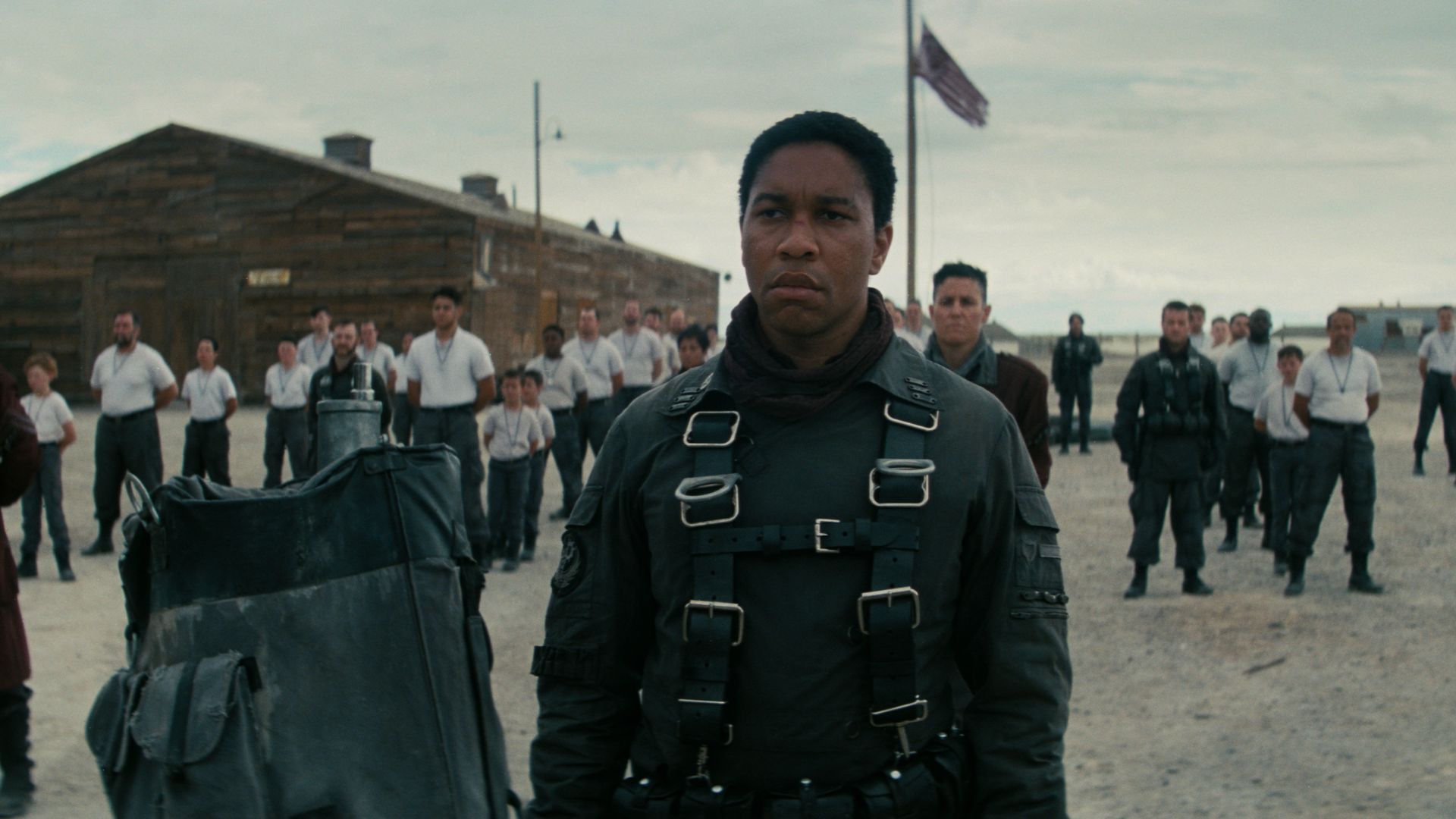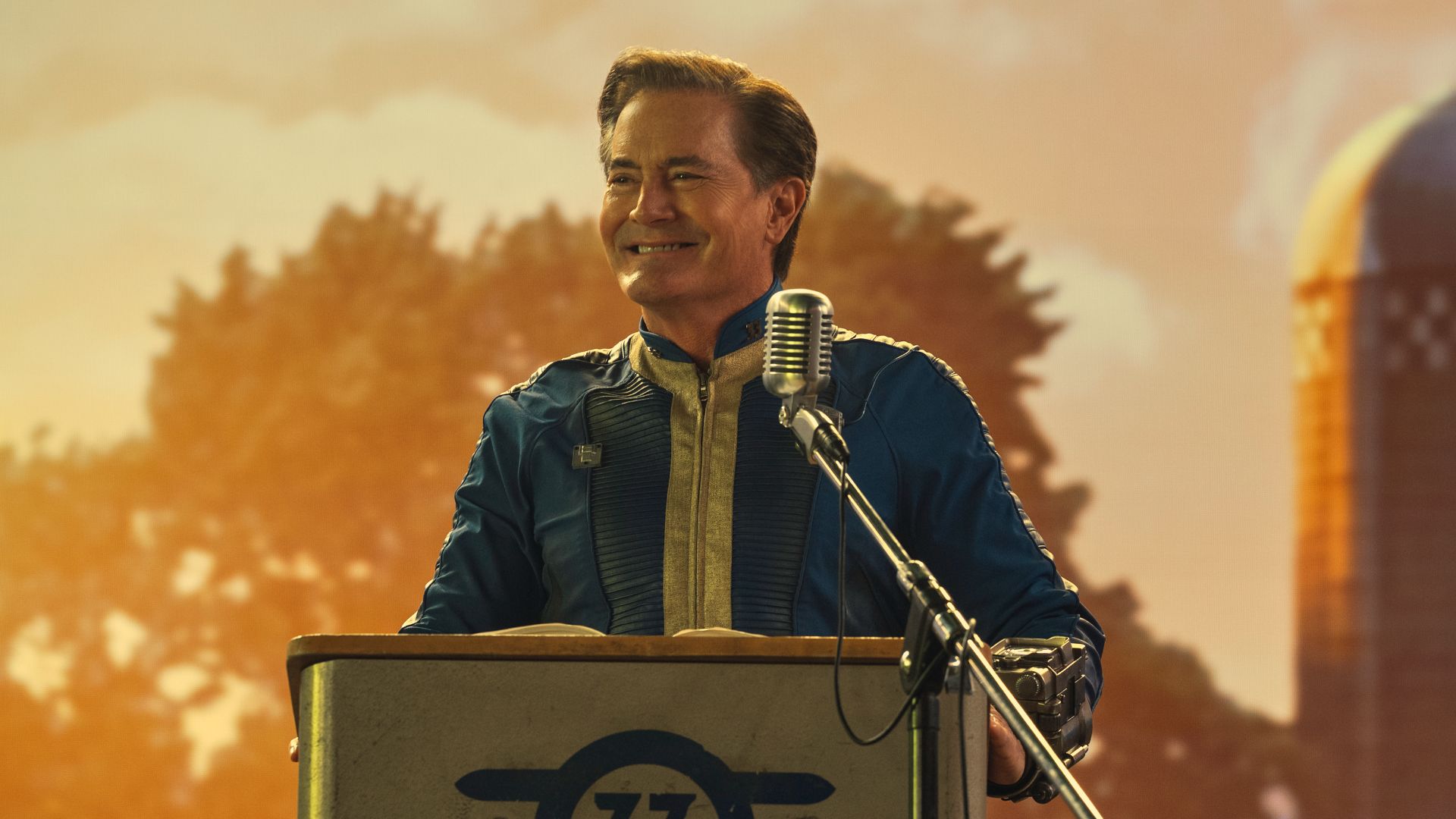
It’s the end of the world – just not as we know it. The Fallout TV show, an adaptation of the RPG video game series overseen by Bethesda, sees the post-apocalypse head to Prime Video with a joyous mix of uproarious comedy, physical humor, and gnarly violence. While it may be guilty of cramming too much into its initial eight-episode run, the first steps out from the Vault and into the streaming landscape for the hugely popular franchise gets a big Vault Boy-style thumbs up from us.
From the get-go, Fallout introduces us to a wasteland like no other, teeming with a unique blend of kitschy retro-futurism and barren, Mad Max-style sandy landscapes (beautifully depicted on the screen thanks to the wise choice to film on location in Namibia).
It’s here in 2296 – some 200-plus years after the bombs first fell – where we find our trio of protagonists, a radiation-infused triptych spotlighting the varying sides of the wasteland. There are steel-clad zealots such as Aaron Moten’s Maximus, Old Hollywood actors-turned-irriadiated-gunslingers like Walton Goggins’ magnetic Ghoul Cooper Howard – and even some blue-sky dreamers.
The latter of which, Lucy (Ella Purnell), is someone who will be familiar to anyone who has ever picked up a Fallout game. The faintly naive, doe-eyed Vault Dweller is living in an underground bunker away from the horrors of the surface with her Overseer father Hank (a game and goofy Kyle MacLachlan). This being Fallout, however, a tragic event soon propels our hero away from the artificial cornfields of the subterranean Americana and into a ravaged world filled with a whole host of mutated nasties and creatures.
Along her journey, she meets Goggins’ Ghoul, and the Brotherhood of Steel’s squire Maximus. Tasked with "securing the Wasteland", the stern Brotherhood member, at first glance, seems like the least interesting of the three protagonists. It’s to Moten’s credit, though, that a series of fumbled events launches the character into a great many surprisingly vaudeville, slapstick situations – one that he makes the most of.
"Sidetracked by random bullshit"

Immediately, though, Fallout encounters a problem: what does it want to be? The first episode alone is a hulking Frankenstein’s Monster of a premiere, one with too many warring pieces stitched together. It’s an entry that would’ve been better served by being streamlined in the editing booth into a Vault-only introduction to mirror the generations of players who have been blinded by the hazy light and limitless potential of striking out on your own in a world where everything wants you dead.
What we get instead is a mish-mash of tones: a big chunk of hoo-rah militarism with the Brotherhood, mixed with the absurdist undertones of the Vault – and then the Ghoul shows up to play John Wayne in a show that already feels fit to burst. It’s something the show never really shakes off, either, to its detriment. It’s a busy, busy series that continually flits back and forth just when some plots are getting going.

That is to say, Fallout doesn’t always color between the lines. The Ghoul laments he’s often "sidetracked by random bullshit" and, in that respect, Fallout sticks true to its source material – and the malleability of the show’s tone often works to its benefit. But those looking for a consistent, forward-moving show, particularly when it comes to the mystery surrounding Lucy’s father, will be left disappointed.
Still, the journey is a blast throughout – pun intended. Showrunners Graham Wagner and Geneva Robertson-Dworet effortlessly juggle their pasts on Portlandia and Captain Marvel respectively to create an amalgamation of action and comedy that’s wholly unexpected, with Ella Purnell’s Lucy being the major winner of such an approach given the darker edge she exhibits as the series wears on.
It’s a genuinely funny show, too. Standout moments include a warped version of The Revenant between a Brotherhood Knight and a mutated bear, a surreal water-breaking scene that is riotous in its execution, and several toe-curling episodes of body horror. Each episode usually sprinkles in such moments of levity and laugh-out-loud moments – ably backed up by comedic masters such as Chris Parnell and Matt Berry – to really tickle the funny bones.
Fallout is also a beautiful rendition of the RPG series many grew up loving. Every minor detail and nod to the franchise’s history is present and accounted for, from real, working PipBoys to nostalgia-inducing audio cues, era-specific ragtime tunes, and even production designer Howard Cummings’ pitch-perfect Vault sets. It’s overflowing with a love, joy, and affection that is rarely seen in video game adaptations.
That doesn’t always work in Fallout’s favor, mind you. The show’s continual fascination with exploring Vault 32 long after Lucy leaves does tend to bog the show down, with its eventual payoff not really making up for hours spent digging into a grand conspiracy amid Overseer politics.
The aforementioned mixing of moods – often in the same scene – does occasionally come across as a bit too forced. Fallout is often at its funniest when it’s not trying to be and just letting emergent events of the Wasteland play out. It would do well to remember that if a teased second season ever comes to fruition.

What Fallout does do, however, is build on top of the sturdy structure of the franchise to often deliver some sharp, acute social commentary. The sixth episode, which dives back into Cooper Howard’s pre-apocalypse past in the proximity of Vault-Tec, is a standout hour and really sticks a knife into the idea of American Exceptionalism. It’s only small proof, but proof enough, that Fallout isn’t content on, well, merely being Fallout. And if there was any consternation that this would be a conservative trek through the sandbox currently occupied by Bethesda, a reveal in the finale that potentially reframes the entire series’ origins washes away any fears.
Fallout doesn’t always set the world on fire, but it certainly ranks as one of the best video game adaptations so far – even if it is frequently guilty of squeezing too many players into its main quest.
In that respect, it keeps the spirit of the 100-hour games: a lot to like, but perhaps too much of it. Still, we get something I would have thought impossible: a hilarious, frenetic, overstuffed Fallout that appeals to long-term fans while standing alone as a bizarrely anarchic slice of madcap mayhem at the end of all things.
Fallout, starring Ella Purnell, Aaron Moten, Walton Goggins, and Kyle MacLachlan, is streaming from April 10 on Prime Video. For more, we've also got some exclusive insight from the cast and creators on the new series which you can read below:
- Fallout TV show
- Fallout TV show stars and creators on working with Todd Howard: "It means a lot to get his approval"
- The Fallout TV show went the extra mile – by creating a real-life Pip-Boy for its cast to use
- Fallout TV show star Walton Goggins intentionally chose not to play Fallout, even after getting the job
- Fallout cast watched Twitch and YouTube streams of the games before filming: "Watching people play was vital"
- Kyle MacLachlan immediately sells us on Fallout – by comparing it to two of his greatest works: Twin Peaks and Blue Velvet
- Fallout release schedule
- Is the Fallout TV show canon? Here’s what Bethesda’s Todd Howard and the showrunners have to say
- Fallout season 1 ending explained: Hank, Bud’s Buds, and *that* finale location
- When does the Fallout TV show take place on the series timeline?
- Will there be a Fallout season 2?
- All of the Fallout Easter eggs we spotted in the TV show
- Fallout’s finale may have just answered the centuries-old mystery behind who started the nuclear apocalypse
- The Fallout TV show just revealed the canon origins of Vault Boy's signature thumbs up
- Fallout season 2 sets up [SPOILER] as a major season 2 location







